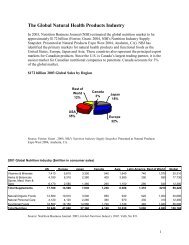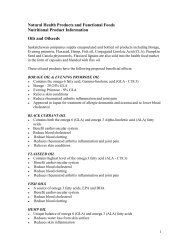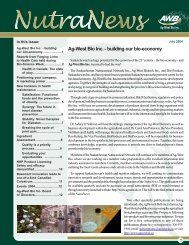Beyond Borders: Global biotechnology report 2010
Beyond Borders: Global biotechnology report 2010
Beyond Borders: Global biotechnology report 2010
Create successful ePaper yourself
Turn your PDF publications into a flip-book with our unique Google optimized e-Paper software.
the bulk of this decline was driven by<br />
Roche’s acquisition of Genentech, which<br />
effectively absorbed one of the giants of the<br />
biotech industry into a big pharma company.<br />
Without this acquisition, the industry’s<br />
revenues would have grown by 8%.<br />
While this is undoubtedly much better than<br />
a 9% decline, it still represents a reduction<br />
from the growth rates the industry has<br />
been accustomed to seeing. For most of<br />
A closer look<br />
the last decade, the biotech industry has<br />
consistently delivered double-digit revenue<br />
growth, driven by strong product sales at the<br />
relatively small number of mature companies<br />
with commercialized products — including<br />
Genentech. That trend started to change in<br />
2007, when revenue growth slowed somewhat<br />
in the US market in the wake of certain new<br />
safety-related warnings. In 2009, there was<br />
a similar slowdown in Europe as UK-based<br />
Seeking efficiency: considerations when operating<br />
beyond borders<br />
As biotech companies in the West look for efficiencies in the<br />
“new normal,” many are increasingly drawn to outsourcing and<br />
overseas operations to drive revenue growth and to capture<br />
relative cost advantages. But operating beyond borders can<br />
have complex tax implications, which should be considered up<br />
front. While large pharmaceutical and biotech companies have<br />
been global for some time and have experience designing tax<br />
structures to minimize effective tax rates and take advantage<br />
of tax incentives in different jurisdictions, this is unfamiliar<br />
territory for many smaller biotechs.<br />
Biotech companies expanding into new geographies may seek<br />
to emulate pharma-like tax strategies, while those that are<br />
already global will need to understand the risks and changing<br />
environment that impact their effective tax rates. Those still in<br />
the early stages of globalization should evaluate the feasibility<br />
of multinational structures, given the changing tax environment.<br />
They will also need to consider the political and economic<br />
stability of potential countries for location of facilities and<br />
availability of needed workforce.<br />
At a time when the global recession has negatively impacted<br />
tax revenues, many governments are working more closely<br />
with each other to reduce the ability of companies to minimize<br />
taxes through cross-border transactions. Some jurisdictions<br />
Shire — the largest company by revenues<br />
in the European market — faced what it<br />
called a “transformational year.” Shire’s<br />
revenue growth flattened when one of its<br />
leading products faced generic competition<br />
for the first time. While increasing generic<br />
competition and pricing pressure will<br />
continue to squeeze the industry’s revenue<br />
growth in the new normal, it is worth noting<br />
that the slowdown in 2009 cannot fully be<br />
Bruce Bouchard<br />
Ernst & Young LLP<br />
have enacted legislation to restrict the ability to defer foreign<br />
profits by expanding economic substance and business purpose<br />
doctrines and by limiting the deductibility of worldwide interest<br />
expense and headquarter expenses.<br />
Still, there are opportunities to minimize global tax rates by<br />
proactively managing the ownership and development of<br />
intellectual property rights on a worldwide basis. An important<br />
element of effective tax planning is the alignment of tax<br />
strategies with business activities and objectives. Many of<br />
these strategies take time to mature as intellectual property is<br />
developed, so it is important for early-stage biotech companies<br />
to proactively consider tax planning long before a product is<br />
ready for commercialization.<br />
<strong>Global</strong> organizations, or those considering going global, should:<br />
• Align the tax strategy with the business strategy<br />
• Evaluate the systems and resources for managing tax risk<br />
• Strategically manage tax issues<br />
• Include global tax risk in corporate governance planning<br />
• Stay current on tax policy and legislative developments<br />
55








